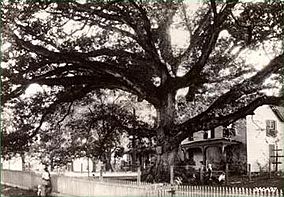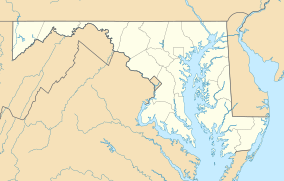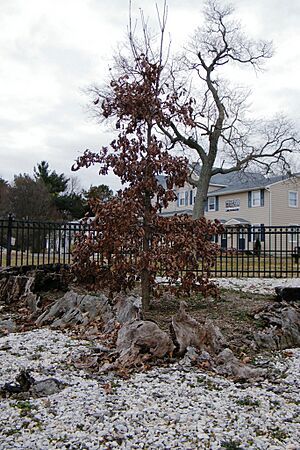Wye Oak facts for kids
Quick facts for kids Wye Oak State Park |
|
|---|---|
|
IUCN Category III (Natural Monument)
|
|

Wye Oak, September 1929
|
|
| Location | Wye Mills, Maryland, United States |
| Area | 29 acres (12 ha) |
| Elevation | 43 ft (13 m) |
| Designation | Maryland state park |
| Established | 1939 |
| Administrator | Maryland Department of Natural Resources |
| Website | Wye Oak State Park |
The Wye Oak was a giant white oak tree. It was the largest white oak in the United States. From 1941 until 2002, it was the official State Tree of Maryland.
Today, Wye Oak State Park protects the land where this amazing tree stood. The park is located in Wye Mills, Talbot County, Maryland. The Wye Oak lived for more than 400 years in this spot.
The Wye Oak was thought to be over 460 years old when it fell. A big thunderstorm with strong winds knocked it down on June 6, 2002. The tree was huge! Its trunk was about 32 feet (9.7 meters) around at chest height. It stood 96 feet (29 meters) tall, and its branches spread out 119 feet (36 meters) wide.
Scientists believe the acorn that grew into the Wye Oak sprouted around the year 1540. Even when it fell, the Wye Oak was still producing acorns.
The Wye Oak became famous in 1909. That's when Maryland State Forester Fred W. Besley measured it for the first time. In 1919, it was featured in American Forestry magazine. It was the first tree in their "Tree Hall of Fame."
The Wye Oak even inspired a special program. Fred W. Besley started the Big Tree Champion Program in 1925. In 1940, the American Forestry Association named the Wye Oak one of its first National Champion Trees.
Over the years, the tree lost some large branches. One fell in 1956, and another in 1984. This second branch weighed over 70,000 pounds! Park managers worked hard to keep the tree healthy. They used fertilizer, insecticide, and special supports for its branches. These efforts helped the Wye Oak live an exceptionally long life.
Wye Oak State Park: A Special Place
The Maryland General Assembly bought the Wye Oak and the land around it in 1939. This is how Wye Oak State Park was created. When it first started, the park was just over one acre in size. It was one of the smallest state parks.
Today, the park covers 29 acres. This larger area helps protect a nearby stream valley. The exact spot where the Wye Oak stood is still mostly untouched. A special plaque placed there in 1921 still marks the site.
The park also has a historic building. It includes a one-room brick schoolhouse from colonial times. This schoolhouse is the second oldest one in Talbot County.
Cloning the Wye Oak: A New Beginning
The Wye Oak was special not just for its age and size. It was also unusually strong against tree diseases like oak wilt fungus and pests like the gypsy moth. Dr. Frank Gouin, a professor at the University of Maryland, College Park, led a project to clone the tree.
Cloning means making an exact copy of a plant. This project was a success! The first two cloned saplings (young trees) were planted at Mount Vernon on April 26, 2002.
Another clone was planted right where the original tree's trunk used to be. This happened during a ceremony on June 6, 2006. A marker at the site remembers this special event.
Art from the Wye Oak: Preserving its Legacy
After the Wye Oak fell, people worked quickly to save parts of the tree. Even before it fell, pieces of the tree that had broken off were used to create art. For example, a statue of two children planting a tree in Annapolis was made from its wood.
A very large section of the fallen tree became a new desk for the Maryland governor's office. Other pieces of the wood were given to artists and craftspeople. They used the wood to make carvings, sculptures, paintings, furniture, and serving dishes. The Department of Natural Resources even created an online gallery to show off these beautiful creations.
 | James B. Knighten |
 | Azellia White |
 | Willa Brown |



